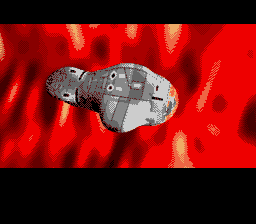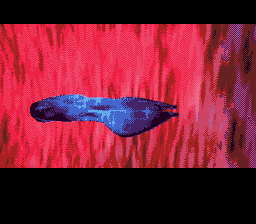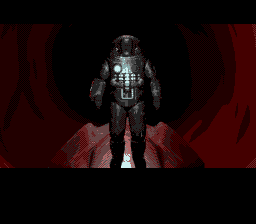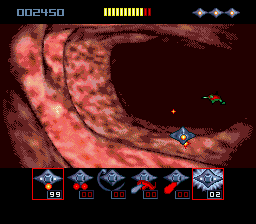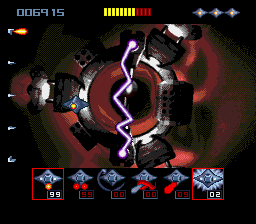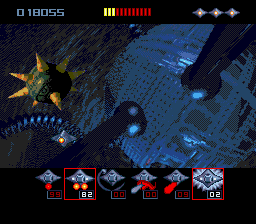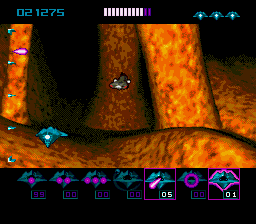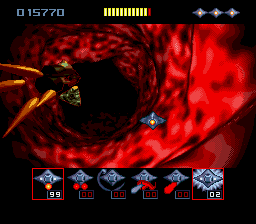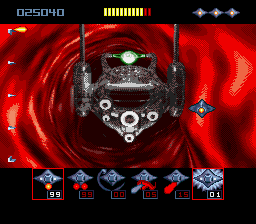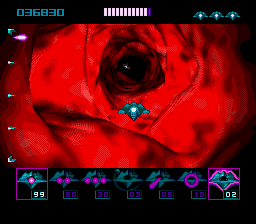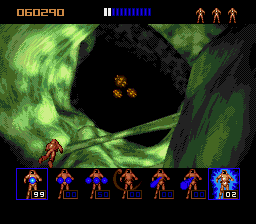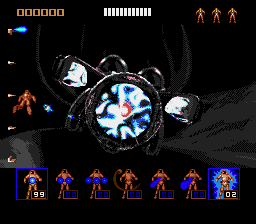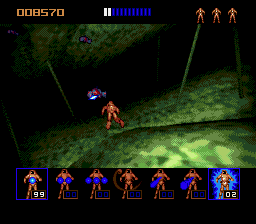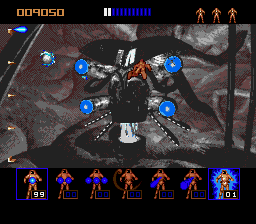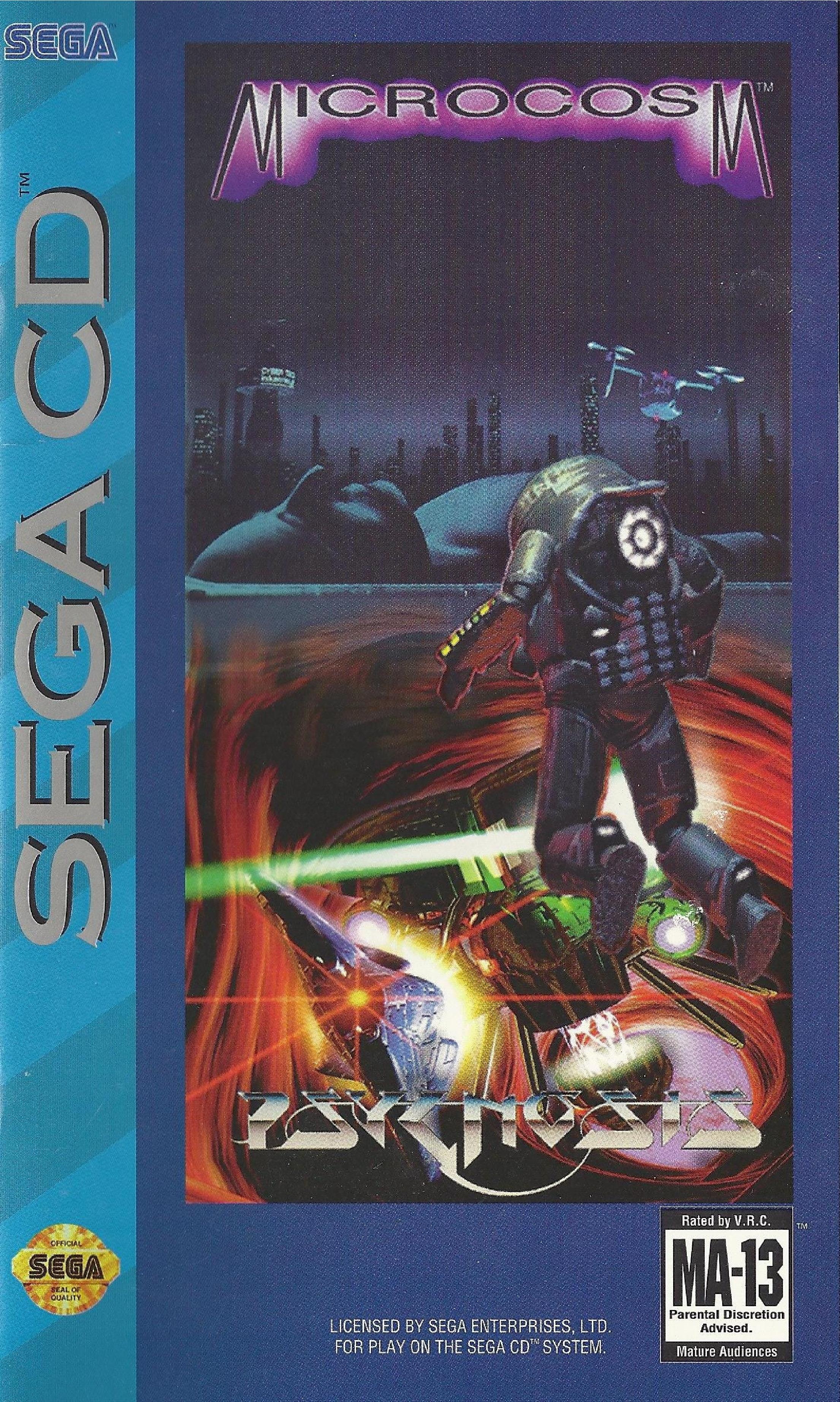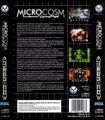Difference between revisions of "Microcosm"
From Sega Retro
m (Text replacement - "\| developer=(.*) \| system" to "| developer=$1 | distributor={{company|Tec Toy|region=BR}} | system") |
|||
| Line 40: | Line 40: | ||
|MCD|password | |MCD|password | ||
}} | }} | ||
| + | | properties={{Properties|MCD|sgi}} | ||
}} | }} | ||
'''''{{PAGENAME}}''''' (マイクロコズム) is a [[Sega Mega-CD]] [[full-motion video]] rail shooter game developed by [[Psygnosis]]. A port of the developer's 1993 game ''[[wikipedia:Microcosm (video game)|Microcosm]]'', it was first published in the United States and Europe by [[Psygnosis]] themselves in January 1994, and was later brought to Japan the following month by publisher [[Victor Entertainment]]. | '''''{{PAGENAME}}''''' (マイクロコズム) is a [[Sega Mega-CD]] [[full-motion video]] rail shooter game developed by [[Psygnosis]]. A port of the developer's 1993 game ''[[wikipedia:Microcosm (video game)|Microcosm]]'', it was first published in the United States and Europe by [[Psygnosis]] themselves in January 1994, and was later brought to Japan the following month by publisher [[Victor Entertainment]]. | ||
Revision as of 16:27, 14 October 2024
| |||||||||||||||||||||||||||||||||||||||||||||
| Microcosm | |||||||||||||||||||||||||||||||||||||||||||||
|---|---|---|---|---|---|---|---|---|---|---|---|---|---|---|---|---|---|---|---|---|---|---|---|---|---|---|---|---|---|---|---|---|---|---|---|---|---|---|---|---|---|---|---|---|---|
| System(s): Sega Mega-CD | |||||||||||||||||||||||||||||||||||||||||||||
| Publisher: Psygnosis (US, Europe), Victor Entertainment (Japan) | |||||||||||||||||||||||||||||||||||||||||||||
| Developer: Psygnosis | |||||||||||||||||||||||||||||||||||||||||||||
| Distributor: Tec Toy (BR) | |||||||||||||||||||||||||||||||||||||||||||||
| Original system(s): PC | |||||||||||||||||||||||||||||||||||||||||||||
| Genre: Shooting[1][2] | |||||||||||||||||||||||||||||||||||||||||||||
| Number of players: 1 | |||||||||||||||||||||||||||||||||||||||||||||
| |||||||||||||||||||||||||||||||||||||||||||||
|
Microcosm (マイクロコズム) is a Sega Mega-CD full-motion video rail shooter game developed by Psygnosis. A port of the developer's 1993 game Microcosm, it was first published in the United States and Europe by Psygnosis themselves in January 1994, and was later brought to Japan the following month by publisher Victor Entertainment.
Contents
Story
Set in the year of AD 2051, the game takes place in a dystopian futuristic setting on an alien planet called Bodor, located in the Bator System. The galaxy's two largest conglomerates — Cybertech, considered the more compassionate of the two, and Axiom, thought to be the more oppressive corporation — compete to achieve premier status in the business world, a position known as CORP 1.
Because of heavy mining operations on the planet from the corporations, most of Bodor is uninhabitable due to pollution, forcing 87% of the population onto 2% of the planet's land. Because of this, poverty, crime and disease are rampant in the cities. Axiom also claims that Cybertech is responsible for the death of Axiom's former president.
Axiom injects Cybertech president Tiron Korsby's body with microscopic droids designed to penetrate his brain and control his mind. Cybertech, however, learns of this plan and injects Korsby with their own piloted submarines shrunken down to a microscopic size to destroy Axiom's droids and prevent them from controlling Korsby's mind.
Gameplay
The game is a rail shooter where the player navigates small craft through the human body. The player has control over the ship's horizontal and vertical movements, but movement into the screen along the third axis is dictated by the game. The limitations of the Mega-CD mean a pseudo-3D effect is achieved through full-motion video, with the player's craft and enemies depicted as scaling sprites. The video backgrounds contain collision zones that can block the player's movement or fire, though colliding with terrain does not do damage. While some versions of Microcosm opt for a first-person perspective, the Mega-CD uses a third-person view at all times.
There are multiple vehicles, each employed on different stages: the Spook Series 4 Pod, the Hunter Killer RS-18, and the S2-21 Pressure Suit. Each ship moves with the D-Pad and fires with ![]() . The player can cycle through the available weapons, shown on the bottom of the screen, with
. The player can cycle through the available weapons, shown on the bottom of the screen, with ![]() . The ship's primary weapon has endless ammunition, but other weapons have a limited supply that can be increased by collecting power-ups after destroying enemies. Each ship starts with two uses of a special weapon, which is a Smart Bomb for the Pod and the Pressure Suit and a Shield for the Hunter Killer. The special weapon is used with
. The ship's primary weapon has endless ammunition, but other weapons have a limited supply that can be increased by collecting power-ups after destroying enemies. Each ship starts with two uses of a special weapon, which is a Smart Bomb for the Pod and the Pressure Suit and a Shield for the Hunter Killer. The special weapon is used with ![]() .
.
The ship has an energy bar the top of the screen that depletes as it takes damage from enemies. The ship explodes if it runs out of energy, costing the player a life. If the player has an extra life remaining, the stage restarts from the beginning; there are no checkpoints. The player has three lives, and the game ends when the player exhausts them all. The two stages played using the Hunter Killer involve chasing capsules, and the game also ends if the player fails to destroy the capsule before the end of the stage. The player is given a password when the game ends for continuing the game.
Vehicles
| Spook Series 4 Pod | |
|---|---|
| Used in Stages 1 and 3. Equipped with the Single Fire, Double Fire, Companion Cannon, Missile, Laser, and Smart Bomb weapons. | |
| Hunter Killer RS-18 | |
| Used in Stages 2 and 4. Equipped with the Single Fire, Double Fire, Triple Fire, Companion Cannon, Laser, Sonic Blast, and Shield weapons. | |
| S2-21 Pressure Suit | |
| Used in Stages 5 and 6. Equipped with the Single Fire, Double Fire, Triple Fire, Companion Cannon, Laser, Flamer, and Smart Bomb weapons. |
Items
| Double Fire | |
|---|---|
| Gives the player ammunition for the Double Fire weapon. | |
| Triple Shot | |
| Gives the player ammunition for the Triple Fire weapon. | |
| Companion Cannon | |
| Gives the player ammunition for the Companion Cannon weapon. | |
| Laser | |
| Gives the player ammunition for the Laser weapon. | |
| Missile | |
| Gives the player ammunition for the Missile weapon (for the Pod). | |
| Flamer | |
| Gives the player ammunition for the Flamer weapon (for the Pressure Suit). | |
| Shield | |
| Gives the player another use of the Shield ability (for the Hunter Killer). | |
| Sonic Blast or Smart Bomb | |
| Gives the player ammunition for the Sonic Blast weapon (for the Hunter Killer) or another use of the Smart Bomb ability (for the Pod and Pressure Suit). | |
| Energy | |
| Restores all of the ship's lost energy. |
Stages
| The Cephalic Vein | |
|---|---|
| The Left Lung | |
| The Superior Vena Cava and the Heart | |
| The Carotid Artery | |
| The Brain 1 | |
| The Brain 2 | |
History
Development
Microcosm was first seen in demo form for the CDTV platform in 1991, but soon became an FM Towns title, with development partially funded by Fujitsu prior to the game being ported to other platforms. The full-motion video was rendered using Silicon Graphics Indigo workstations alongside life action footage[12].
Live action footage was recorded at night with an S-VHS recorder, and features members of the team as opposed to paid actors[13]. 2D graphics (and textures) were drawn on Amigas[13].
In total, the game's raw data amassed over 6 GB[14], with image data being stored in 24-bit colour before being compressed for the various platforms[15]. Initial development cost between $600,000 and $750,000 USD[16].
Unlike other Mega-CD titles, Microcosm chooses to limit its full-motion video sequences to 16 colours (a quarter of the 64 available to the system), presumably as a space-saving measure.
Release
Microcosm was later rereleased in the two-disc Mega-CD compilation Prime / Microcosm, published exclusively in the United States by Sony Imagesoft in December 1995.
Legacy
While Microcosm was considered a financial success, the game is not held in high regard, with even Psygnosis considering it more as an experiment for the CD-ROM format than a good video game[17].
Feedback from Microcosm led to a spiritual successor, Novastorm having a greater focus on gameplay.
Versions
Microcosm was released for a variety of home platforms, including the 3DO, Amiga CD32, FM Towns, and IBM PC. All other versions are able to output higher quality full-motion video than the Mega-CD version, and in many cases, at higher resolutions.
Production credits
- The Artists: Jim Bowers, Nicky Carus-Westcott, Garvan Corbett, Paul Franklin, John Harris, James McDonald, Rogan MacDonald, James Robinson, Digby Rogers, Louise Smith
- The Programmers: Gavin Dodd, Paul Frewin, Martin Linklater, Dominic Mallinson, Simon Moore, Stuart Sargasson, Dave Smith, Andrew Toone, David Worrall, Chris Wylie
- Music Composed, Produced and Performed by: Mike Clarke, Kevin Collier, Phil Morris, Tim Wright, Rick Wakeman
- Quality Assurance: Jeff Clushaw, Jason Ennion
- Concept: Neil Thompson, Nik Wild
- Story: Mark Tsai, Nik Wild
- Marketing and Publicity: Mark Blewitt, Sue Campbell, Maggie Goodwin, Phil Sandock
- Manual Text: Richard Browne, Richard Biltcliffe, Mark Tsai, David Worrall
- D.T.P.-U.K: Keith Hopwood
- D.T.P.-U.S: Harry Bernard
- Third Party Liaison: Ian Grieve
- Guardian Design: Nick Burcombe, Jim Bowers
- Storyboard: Richard Browne, Neal Sutton
- Producer: Greg Duddle
- Project Manager: John White
- Acknowledgements to: Jonathan Ellis, Ian Hetherington, Jerry Wolosenko
- Intro Sequence: Jim Bowers, John Harris, Chris Moore
- Film Crew: Nicky Carus-Westcott, Lee Carus-Westcott, Paul Franklin, Richard Browne, John Harris, Nick Burcombe, Jim Bowers, Andy Toone, Simon Moore, Jeff Bramfitt, Mike Waterworth, Neil Thompson, Louise Smith
- Ending Sequence: Paul Franklin, Garvan Corbett, Nicky Carus-Westcott
Magazine articles
- Main article: Microcosm/Magazine articles.
Promotional material
- Main article: Microcosm/Promotional material.
Physical scans
| Sega Retro Average | ||||||||||||||||||||||||||||||||||||||||||||||||||||||||||||||||||||||||||||||||||||||||||||||||||||||||||||||||||||||||||||||||||||||||||||||||||||||||||
|---|---|---|---|---|---|---|---|---|---|---|---|---|---|---|---|---|---|---|---|---|---|---|---|---|---|---|---|---|---|---|---|---|---|---|---|---|---|---|---|---|---|---|---|---|---|---|---|---|---|---|---|---|---|---|---|---|---|---|---|---|---|---|---|---|---|---|---|---|---|---|---|---|---|---|---|---|---|---|---|---|---|---|---|---|---|---|---|---|---|---|---|---|---|---|---|---|---|---|---|---|---|---|---|---|---|---|---|---|---|---|---|---|---|---|---|---|---|---|---|---|---|---|---|---|---|---|---|---|---|---|---|---|---|---|---|---|---|---|---|---|---|---|---|---|---|---|---|---|---|---|---|---|---|---|
|
| 69 | |
|---|---|
| Based on 30 reviews | |
Technical information
- Main article: Microcosm/Technical information.
References
- ↑ File:Microcosm MCD JP Box Back.jpg
- ↑ 2.0 2.1 https://sega.jp/fb/segahard/mcd/soft_licensee.html (Wayback Machine: 2019-06-10 17:56)
- ↑ Beep! MegaDrive, "February 1994" (JP; 1994-01-08), page 11
- ↑ Press release: 1994-01-06: PSYGNOSIS INTRODUCES 'INTERACTIVE CINEMA' WITH THE DEBUT OF MICROCOSM
- ↑ 5.0 5.1 Game Players, "Vol. 7 No. 4 April 1994" (US; 1994-0x-xx), page 69
- ↑ 6.0 6.1 Mean Machines Sega, "February 1994" (UK; 1993-12-28), page 81
- ↑ 7.0 7.1 Mega, "February 1994" (UK; 1994-01-20), page 27
- ↑ Computer Trade Weekly, "" (UK; 1994-01-31), page 2
- ↑ Mega Power, "December 1993" (UK; 1993-11-18), page 29
- ↑ Video Games, "9/93" (DE; 1993-08-25), page 43
- ↑ Megazone, "February 1994" (AU; 1994-01-26), page 34
- ↑ Edge, "October 1993" (UK; 1993-08-19), page 71
- ↑ 13.0 13.1 Edge, "October 1993" (UK; 1993-08-19), page 73
- ↑ Edge, "October 1993" (UK; 1993-08-19), page 72
- ↑ Edge, "October 1993" (UK; 1993-08-19), page 74
- ↑ Edge, "October 1993" (UK; 1993-08-19), page 77
- ↑ Next Generation, "April 1998" (US; 1998-03-17), page 47
- ↑ File:Microcosm mcd us manual.pdf, page 48
- ↑ Sega Mega Drive Advanced Gaming, "December 1993" (UK; 1993-10-28)
- ↑ Ação Games, "Março 1994" (BR; 1994-03-01), page 26
- ↑ Beep! MegaDrive, "March 1994" (JP; 1994-02-08), page 21
- ↑ Consoles +, "Décembre 1993" (FR; 1993-1x-xx), page 160
- ↑ Digitiser (UK) (1994-02-22)
- ↑ Electronic Gaming Monthly, "March 1994" (US; 1994-xx-xx), page 38
- ↑ Famitsu, "1994-03-04" (JP; 1994-02-18), page 1
- ↑ Gamers, "Mai/Juni 1994" (DE; 1994-05-06), page 41
- ↑ GamesMaster, "February 1994" (UK; 1994-01-20), page 79
- ↑ Games World (Teletext) (UK) (+0:00)
- ↑ Hippon Super, "April 1994" (JP; 1994-03-03), page 60
- ↑ Hobby Consolas, "Junio 1994" (ES; 1994-xx-xx), page 136
- ↑ Hyper, "February 1994" (AU; 199x-xx-xx), page 54
- ↑ Joypad, "Février 1994" (FR; 199x-xx-xx), page 94
- ↑ Mega, "February 1994" (UK; 1994-01-20), page 26
- ↑ Mega Action, "January 1994" (UK; 1993-12-30), page 38
- ↑ Mega Force, "Décembre 1993" (FR; 1993-12-10), page 120
- ↑ Mega Fun, "05/94" (DE; 1994-04-20), page 109
- ↑ MegaTech, "January 1994" (UK; 1993-12-21), page 60
- ↑ Player One, "Janvier 1994" (FR; 199x-xx-xx), page 122
- ↑ Sega Magazine, "February 1994" (UK; 1994-01-10), page 109
- ↑ Sega Power, "February 1994" (UK; 1994-01-06), page 50
- ↑ Sega Pro, "Xmas Special 1993" (UK; 1993-12-02), page 34
- ↑ Sega Zone, "February 1994" (UK; 1994-01-27), page 42
- ↑ Sega Force, "6/94" (SE; 1994-09-14), page 30
- ↑ Sega Saturn Magazine, "September 1995" (JP; 1995-08-08), page 85
- ↑ Super Juegos, "Abril 1994" (ES; 1994-0x-xx), page 116
- ↑ Video Games, "5/94" (DE; 1994-04-27), page 91
- ↑ VideoGames, "April 1994" (US; 1994-0x-xx), page 82
| Microcosm | |
|---|---|
|
Main page | Magazine articles | Video coverage | Reception | Promotional material | Technical information
Demos: Microcosm Demo CD (1993) | |
- 1 player games
- JP Mega-CD games
- All JP games
- US Mega-CD games
- All US games
- EU Mega-CD games
- All EU games
- DE Mega-CD games
- All DE games
- UK Mega-CD games
- All UK games
- AU Mega-CD games
- All AU games
- BR Mega-CD games
- All BR games
- Mega-CD games
- 1994 Mega-CD games
- All 1994 games
- Mega-CD shoot-'em-up games
- All shoot-'em-up games
- All games
- Old-style rating (mdag)
- Old-style rating (megamachines)
- Update ratings template
- 1 old ratings
- Microcosm


